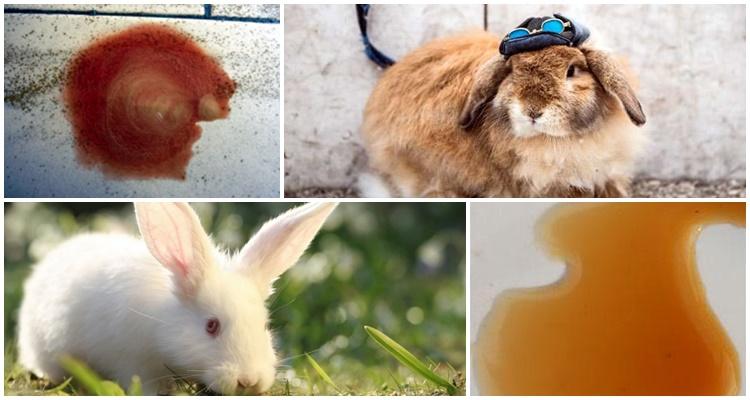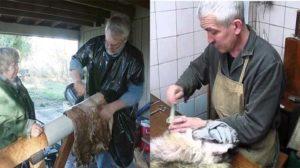Why did the rabbit's urine turn red and what to do, preventive measures
Stress, taking antibiotics, improper diet, lack of fluid in the body - this is why a rabbit may have red urine. In addition to these reasons, there are a number of other provoking factors. The appearance of blood in the urine is often a symptom of pathology - malignant neoplasms, inflammation of the kidneys, polyps, and others. Treatment depends on the cause of the problem. However, it is better to avoid such symptoms by resorting to preventive measures.
What kind of urine should rabbits have?
To rule out possible health problems of the animal, you need to pay attention to the color of the pet's urine. If the rabbit is healthy, the body fluid will be straw colored. At the same time, the presence of a slight reddish tint is the norm. If the color change occurred after taking antibiotics or a change of environment, you should not worry about this. After 2-3 days, the symptom should disappear.
Why do animals have red urine?
Red urine in a rabbit may result from:
- Antibiotic treatment.
- Excessive carotene content in food (beets, carrots).
- The presence of needles in the pet's diet. The latter contains components that change the color of the selection.
- Dehydration. Inadequate fluid intake causes urine to become concentrated, taking on a dark brown or reddish tint.
- Stress. A sudden change in the environment causes a negative reaction in the animal, as a result of which the discharge changes color.
- Urolithiasis. This condition makes urination difficult, painful. Since there are small solid particles in the urine, and little fluid itself is released, the walls of the canals are damaged, and the rabbit pees with blood.
- Pathologies of the genitourinary system. An infection that enters the animal's body provokes internal bleeding, due to which the discharge becomes reddish.
- The appearance of tumors in the uterus.
- Injuries to the organs of the genitourinary system.
- Abortion.

Red urine in a rabbit during pregnancy is a dangerous symptom, upon detection of which it is necessary to urgently show the animal to a veterinarian. The presence of blood in the discharge can be a consequence of a miscarriage, as well as inflammation in the kidneys.
What should be done when detected?
If the urine has a uniform reddish color, you need to find out if it is blood or something else. This requires testing with hydrogen peroxide. This requires adding a small amount of solution to the urine and analyzing the result. If the liquid fizzes and foams, then it contains blood.In the absence of such a reaction, it can be argued that the urine is stained with carotene.
If a rabbit has kidney or bladder stones, the doctor will prescribe the following medications:
- antispasmodics;
- pain relievers;
- drugs that dissolve stones;
- antibiotics;
- means for increasing the acidity of urine.
If there is a blockage of the urethra, an urgent operation is performed to remove the stone. In the presence of inflammatory processes, the veterinarian will prescribe a course of antibiotics. As an addition to the main treatment, you can use folk remedies, for example, decoctions of plantain, tansy. This method is unacceptable if red blotches or clots are found in the urine. In this case, urgent veterinary care is required, including surgical intervention.
Prevention
To prevent the appearance of blood in the urine, it is necessary to monitor the health of the organs of the urinary system, as well as the reproductive organs of the animal. You should adhere to these rules:
- Observe the diet, exclude cereals and other prohibited foods from the daily menu. Food must be fresh and of good quality.
- Make sure that the rabbit does not suffer from dehydration (he must always have access to clean water).
- Filter the water.
- Make sure that your rabbit gets enough nutrients with food, especially vitamin C.
- Avoid excessive intake of calcium in the animal's body.
- The room where the rabbit is located must be protected from drafts. Regardless of the season, the animal should not be exposed to overheating or hypothermia.
- Try not to stress the animal.
- Regularly clean the room where the rabbit is kept.
- Provide dry, warm and soft bedding during the winter.
- Get routine vaccinations.
- Worm animals regularly.
- If you have previously identified health problems, you must regularly take a urine test (at least once every three months).
Red urine in rabbits can be a symptom of a serious illness or indicate the peculiarities of the animal's diet. Depending on the established cause, treatment is prescribed (if necessary). To exclude the manifestation of such signs in the future, preventive measures must be followed.












